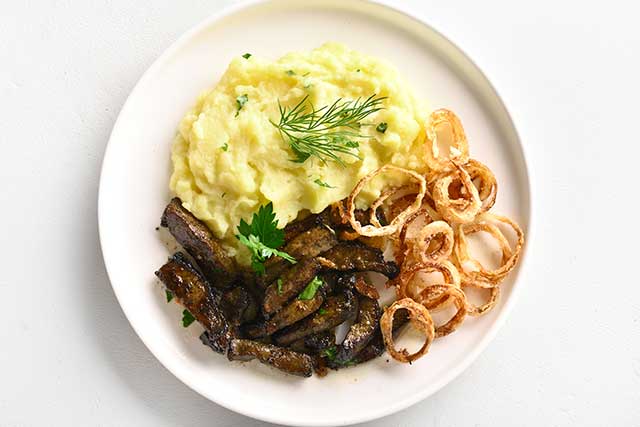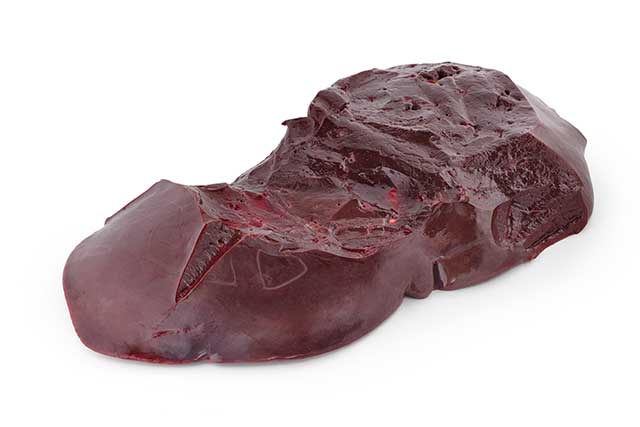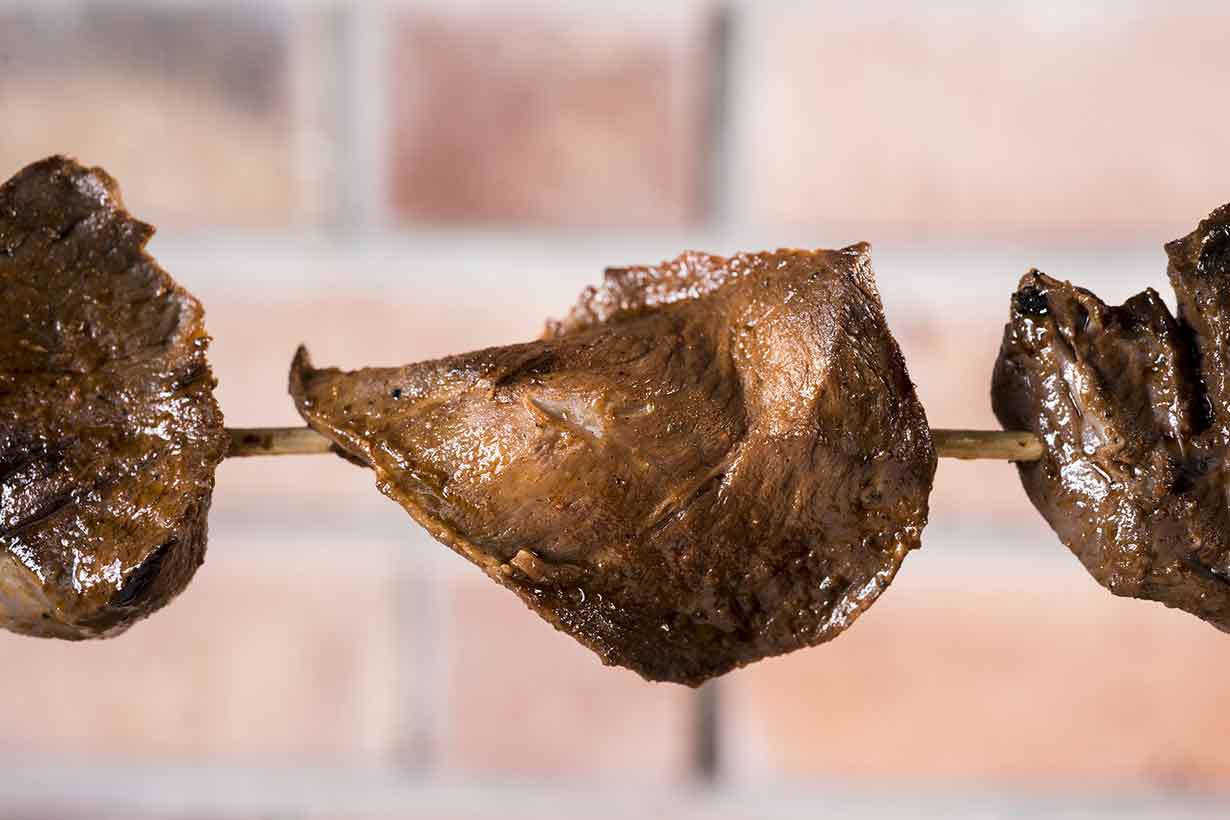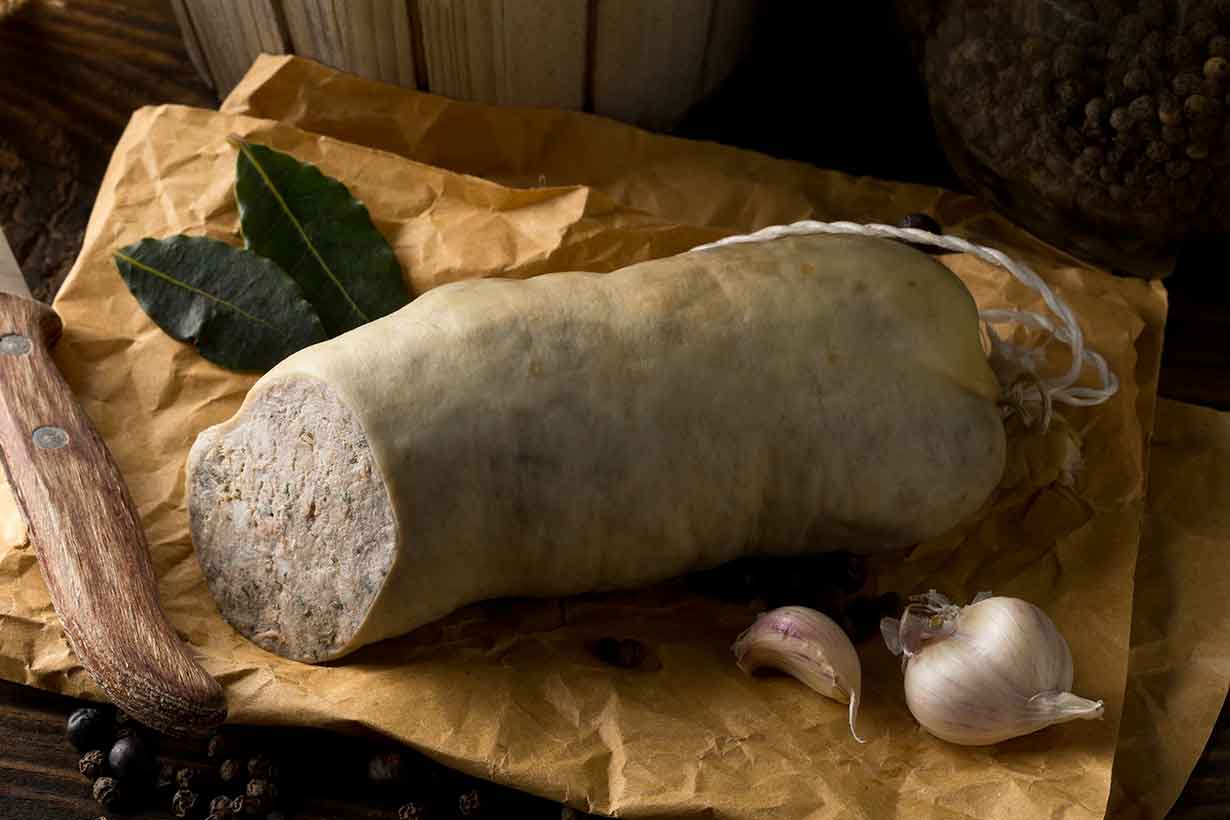Gram for gram, beef liver is among the most nutrient-rich foods.
This nutrient-dense organ meat contains substantial amounts of vitamin B12, copper, and many other essential nutrients.
However, just because something is rich in nutrients does not necessarily mean there are no negative points.
For instance, some people claim that liver contains “toxins”. Is there any truth to that?
This article will take an in-depth look at the benefits—and potential downsides—of eating beef liver.
Is it good or bad for you?
Benefits of Beef Liver

First, we will examine the nutrition profile and eight of the most significant benefits of beef liver consumption.
1) Beef Liver Has An Impressive Nutrition Profile
Beef liver is one of the most nutrient-dense foods available.
Here you can see the full nutrition facts per 100 grams (raw weight) of beef liver (1).
Calories and Macronutrients
| Calories/Macro | Amount (kcal/grams) |
|---|---|
| Calories | 135 kcal |
| Carbohydrate | 3.9 g |
| Fat | 3.6 g |
| – Saturated Fat | 1.2 g |
| – Monounsaturated Fat | 0.5 g |
| – Polyunsaturated Fat | 0.5 g |
| – Omega-3 | 7.0 mg |
| – Omega-6 | 318 mg |
| Protein | 20.4 g |
Vitamins
| Vitamin | Amount | % RDI |
|---|---|---|
| Vitamin B12 | 59.3 mcg | 988 % |
| Vitamin A | 16899 IU | 338 % |
| Vitamin B2 | 2.8 mg | 162 % |
| Folate | 290 mcg | 72 % |
| Vitamin B3 | 13.2 mg | 66 % |
| Vitamin B6 | 1.1 mg | 54 % |
| Vitamin B1 | 0.2 mg | 13 % |
| Vitamin D | 16.0 IU | 4 % |
| Vitamin K | 3.1 mcg | 4 % |
| Vitamin C | 1.3 mg | 2 % |
| Vitamin E | 0.4 mg | 2 % |
RDI = Reference Daily Intake (the amount of each nutrient we should try to consume each day).
Minerals
| Mineral | Amount | % RDI |
|---|---|---|
| Copper | 9.8 mg | 488 % |
| Selenium | 39.7 mcg | 57 % |
| Phosphorus | 387 mg | 39 % |
| Iron | 4.9 mg | 27 % |
| Zinc | 4.0 mg | 27 % |
| Selenium | 39.7 mg | 16 % |
| Potassium | 313 mg | 9 % |
| Magnesium | 18.0 mg | 5 % |
| Sodium | 69.0 mg | 3 % |
| Calcium | 5.0 mg | 1 % |
As we can see from these nutrition tables, beef liver contains a wide and varied range of nutrients.
Among these nutrients, beef liver contains significant quantities of copper, selenium, phosphorus, vitamin A, and B vitamins.
2) Beef Liver Contains the Essential Nutrient Choline
Another benefit of beef liver is that it provides a source of the hard-to-get nutrient choline.
Choline was once thought to be a vitamin, and it was previously referred to as ‘vitamin B4’.
Despite not being a vitamin, it closely resembles one, and it is an essential nutrient with a broad range of functions in the human body (2).
For adults over the age of 18 years old, the adequate intake (AI) level for choline is set at 550 mg per day (3).
Although many foods contain choline, it is difficult to get sufficient amounts of the nutrient from plant foods, and the two best sources of choline are beef liver and eggs.
A three-ounce (85 g) serving of beef liver provides 356 mg of choline, which is equivalent to 65% of the recommended daily value (3).
Among its many functions, choline plays a key role in (4);
- Cell signaling
- Transport of lipids (fats)
- Protecting against liver damage
3) An Excellent Source of Protein
Similar to regular muscle meat, beef liver contains a significant amount of protein.
Per 100 grams, beef liver offers 20.4 grams of “complete protein” (1).
A complete protein contains an adequate amount of all nine essential amino acids (5).
4) Very Low In Calories

Beef liver is very low in calories.
With a calorie count of 135 calories per 100 grams, it contains even fewer than 90% lean beef, which provides 176 calories (6).
While the calorie content of food does not make it inherently healthy or unhealthy, it does show how nutrient-dense liver is.
For instance, beef liver contains more nutrients than any regular muscle meat (like beef or pork) for fewer calories.
Beef liver is also more nutrient-dense than other types of liver (such as chicken liver).
5) Provides a Source of CoQ10
Beef liver provides a good source of Coenzyme Q10 with an average of 3.3 mg per 100 grams (7).
Coenzyme Q10, more simply known as CoQ10, is a fat-soluble coenzyme that plays a vital role in the body by (8);
- Providing energy to the body’s cells
- Acting as an antioxidant
- Enhancing the rate at which chemical reactions take place in the body
Furthermore, a systematic review and meta-analysis of randomized trials demonstrated that CoQ10 might have a positive effect on exercise capacity and also in the treatment of heart disease (9).
Regarding CoQ10 and heart failure, an in-depth systematic review of systematic reviews analyzed the evidence for benefits. The totality of the evidence showed that CoQ10 “is associated with a reduction in symptoms and major adverse cardiovascular events” (10).
Additionally, CoQ10 may play a beneficial part in the treatment of a wide range of health conditions from type 2 diabetes to hypertension. However, more research is necessary to either confirm or reject its effectiveness (11).
6) Extremely High In Retinol (“Preformed Vitamin A”)
Beef liver is one of the very best dietary sources of retinol.
For those unaware, there are two forms of vitamin A (12, 13);
- Retinol: People refer to retinol as “preformed vitamin A,” and it is vitamin A in its usable form. Retinol is highly bioavailable.
- Carotenoids: Carotenoids (such as beta-carotene) require converting to retinol before our body can use them. Unfortunately, the conversion rate and bioavailability of carotenoids are poor, and some people with certain genetic traits cannot effectively convert carotenoids to retinol.
For this reason, retinol is the better (more reliable) source of vitamin A.
On the positive side, beef liver offers one of the most substantial quantities of retinol, and a 100-gram serving provides 338% of the RDI (1).
Vitamin A is essential for many reasons, but it is particularly important for vision and the immune system (14).
7) One of the Best Dietary Sources of Copper
Beef liver is very high in copper, an essential mineral that has an important role in maintaining a healthy;
- Immune system
- Nervous system
- Skeletal system
Additionally, copper is necessary for the formation of red blood cells, and it plays a part in iron absorption (15).
Per 100-gram serving, beef liver offers a substantial 488% of the RDI for copper. More than any other food (1).
8) Substantial Source of Vitamin B12
Lastly, the primary key nutrient in beef liver is probably vitamin B12.
Beef liver contains 59.3 mcg of vitamin B12 per 100 grams, which equates to an impressive 988% of the RDI (1).
The role of vitamin B12 in human health is widely understood, and this vital nutrient contributes to (16);
- A healthy brain and nervous system
- Creating and maintaining DNA
- Forming red blood cells
- Metabolism
- Producing energy
In addition to B12, beef liver also provides high quantities of the other essential B vitamins.
Are There Any Dangers of Eating Beef Liver?

As we have seen so far, beef liver is an impressive source of many essential nutrients, and it has a range of health benefits.
However, are there any concerns about eating it?
1) Does Liver Contain Toxins?
If you have been searching the Internet for information on beef liver, you may have noticed some warnings about the “toxins” it contains.
This popular (but wrong) message discusses how the liver’s function in the body is to store toxins for elimination. As a result, in this unscientific but theoretical situation, we may end up consuming the toxins.
However, there is no truth to these claims, and they misunderstand the role of the liver.
In truth, the liver does play a role in breaking down (and eliminating) toxins from the body, but it does not store them.
The detoxication pathway of the liver works via (17);
- Filtering the blood to remove toxins.
- “Neutralizing” toxic chemicals into less harmful compounds.
- Breaking fat-soluble vitamins down into water-soluble compounds so that they can be excreted from the body.
In other words; there is no need to worry about stored toxins in beef liver.
2) Hypervitaminosis A: Can You Eat Too Much Beef Liver?
Vitamin A is a fat-soluble vitamin, and our body (via the liver) is capable of storing excessive amounts of the vitamin.
When we continuously consume excess amounts of vitamin A, our stores can build up and eventually lead to toxicity, otherwise known as hypervitaminosis A (18).
Hypervitaminosis A can progressively cause a wide-ranging number of symptoms, including but not limited to;
- Coma
- Dizziness
- Headaches
- Intracranial (within the skull) pressure
- Joint pain
- Nausea
- Skin problems
The vast majority of hypervitaminosis A cases are from overdosing on vitamin A supplements, but it is possible (but rare) for food sources to cause the condition.
For instance, there are case studies where hypervitaminosis A has developed from long-term frequent intake of beef liver (19).
Hypervitaminosis A has also occurred with domestic cats fed large amounts of raw liver and in humans over-consuming vitamin A-rich foods (20, 21).
How Much Liver Is Too Much?
The tolerable upper limit for vitamin A is 3,000 mcg (10,000 IU) per day for adults over the age of 18 (22).
Per 100 grams, beef liver provides 5,070 mcg (16,899 IU) (1).
As shown from these figures, eating a large amount of beef liver every day is probably not a sensible idea.
However, one or two portions per week should be fine.
Final Thoughts
Overall, beef liver is one of the most nutritious foods in the human diet.
This nutrient-dense organ meat provides a wide range of essential nutrients, and it offers numerous health benefits.
Also, the myths about liver being unsafe due to “stored toxins” is demonstrably false.
Providing we eat beef liver in reasonable amounts, it is a perfectly safe and healthy food choice.
Lastly, for anyone who doesn’t like the taste of liver but still wants the benefits, it may be worth looking into liverwurst.






In the 1960’s to the 1970’s, I used to cook beef, or calves or chicken liver a couple of times a month for my family. I know i felt better after eating it, and my children looked healthier. Then I heard about the prescence of toxins in liver….so i stopped buying it. Recently my holistic dr. was telling me that liver has many nutrients, and it would help me feel better. The dr. told me to buy it in Whole Foods. Also I make sure it is grass-fed and try to buy organic. I’d appreciate knowing if other people are eating liver, where they’re buying it.
Hi Rose,
As noted in the potential dangers section, the idea of liver being “full of toxins” is not science-based, so this shouldn’t be a worry. Personally, I would just opt for whichever liver is affordable. I’m sure Whole Foods sell good food though.
I also eat beef and chicken liver from only grassfed beef and pasture raised chickens.
I was told to avoid liver as it was high in cholesterol and would cause result in higher cholesterol readings if you were prone to high cholesterol. Is this the case or not?
According to the latest (2015-2020) US dietary guidelines, cholesterol is “no longer a nutrient of concern for overconsumption”, hence the lack of focus on dietary cholesterol in this article.
You can read more about that here: https://www.ncbi.nlm.nih.gov/pmc/articles/PMC6129189/
Quote:
“In the new DGAC report, one widely noticed revision was the dropping of dietary cholesterol as a “nutrient of concern.” This surprised the public, but is concordant with scientific evidence demonstrating no appreciable relationship between dietary cholesterol and serum cholesterol1 or clinical cardiovascular events in general populations. The DGAC should be commended for this evidence-based change.”
The human liver produces cholesterol whether we get it from our diet or not. When our intake of dietary cholesterol increases, the liver produces less.
Does liver store hormones and antibiotics that are injected or fed to livestock to Influence growth? What effect would these have on our health?
Hi John,
This is a common myth – please see the section of the article under ‘Dangers’.
Basically, the liver does play a key role in eliminating toxins from the body, but it doesn’t store them.
Hi Michael Joseph,
Thank you for dispelling the myth about liver being a storehouse for toxins. Your explanation makes perfect sense.
Btw, your last paragraph before Final Thoughts reads as follows:
“However, one or two portions per week should not be fine.”
You probably did not intend to include the word “not” in that sentence.
Thank you for the comments and for pointing that out Peter. Now edited!
I’ve been eating beef liver 2 to 3 times a week since I was a little boy. I love it. Fried Onions, steamed carrots, green beans, peas, and a baked potato. I’m a 55 yr old male. My GP recently retired and he told me I ” have blood work of a teenager”. I eat liver, fish, eggs, baked beans, cheese, yogurt, tomatoes, apples, and nuts ( with my red wine) weekly. I walk 2 miles a day. That’s it. I truly believe liver is the perfect food.
From your doctor’s comments, it certainly sounds like you are doing something right with your diet! Glad it’s working so well for you, and I agree that liver is an excellent choice – it’s one of the most nutrient-dense foods out there.
Hi John!
Thanks for sharing this. I just started eating liver and quite like it (more than I thought I would :))
Would you mind sharing how much liver you consume in a week?
Thanks!
Dali